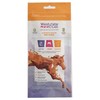Horse Wormers
The increasing levels of resistance to horse wormers is currently an important concern for equine vets and horse owners.
Currently, we are not able to effectively gather all the required information to prescribe this product appropriately via our website. Therefore, to help protect your horse's health and prevent resistance to this medication, we have decided to make it a requirement for a qualified veterinarian to prescribe these products before you buy them from us.
You will need to obtain a written prescription from your Vet and then simply upload or send the prescription to us when you place your order.
We appreciate that this may be frustrating, but this important precaution will help us to protect your horses and prevent resistance to horse wormers for years to come.
For further information about how we are trying to prevent further wormer resistance see the bottom of the page.
Hilton Herbs Weigh Tape
£7.00Hilton Herbs Weigh Tape is an essential tool for owners to accurately estimate their horse or pony’s weight. Made from durable yet supple plastic that won’t distort, this...[More info]
Westgate Labs Pinworm Test Kit
£13.09Westgate Labs Pinworm Test Kit is a reliable testing kit for detecting the presence of pinworm eggs on equines, including horses, ponies, donkeys and mules. This kit includes everything...[More info]
We all have a responsibility to use equine worming products appropriately. Many equine worm species are developing resistance to wormers due to frequent, untargeted use of these products and there are currently no new active ingredients coming to market. Ensuring wormers remain effective, by only using them when needed, is vital for the future health and wellbeing of our horses, ponies, and donkeys.
Your veterinary surgeon is the best person to understand your horses individual worming needs. They can create a targeted testing and, if applicable, treatment program specific to your animal(s) and their environment. Screening before dosing is straightforward (using manure, saliva or in some cases, blood samples) and by only treating animals showing a worm burden it helps ensure you can worm your animal(s) effectively while also reducing the likelihood of resistant worms developing
You can learn more about the current issues with resistance and the strategies being put in place to try and protect the effectiveness of horse wormers by visiting the CANTER website
When testing has shown it is appropriate to worm your horse, horse wormers should be used in a responsible way, at the correct dose rate and during the correct season.
To dose your horse correctly you will need to either weigh your horse or know its weight as accurately as possible. Underdosing can contribute to the worm resistance that is already being seen, whilst overdosing can also be potentially dangerous for your horse.
You can use a weigh tape or a calculation to estimate your horse's weight, although the latter is considered slightly more accurate:
Heart Girth2 (inches) x Body Length (inches) ÷ 300 = weight (lbs)
Testing to determine your horse's worm burden is vital as some horse worms can have a huge impact on your horse's health. Encysted small redworm larvae and tapeworms are two parasite infestations which can require veterinary intervention and treatment: treatment which can run into thousands of pounds. Small redworm are the most common and harmful parasite to affect your horse today, over 90% of which can be encysted in your horse's gut wall. Killing these encysted larvae in the late autumn and early spring, before they emerge and cause potentially fatal intestinal damage, is an important part of any worm control programme.
Tapeworms are responsible for a number of health-related problems in horses, ranging from loss of performance and hair loss to diarrhoea, colic, and painful, potentially fatal perforation of the intestine.

